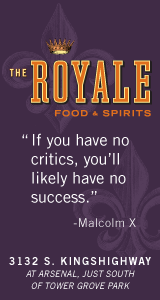By Gabe Bullard
Filed Wednesday, July 25, 2007 at 11:58 AM
Governor Matt Blunt has appointed former St. Louis mayor Vince Schoemehl to the Bi-State Development Agency for the Missouri-Illinois Metropolitan District (Metro).
Schoemehl, 60, was mayor of St. Louis from 1981 to 1993. He is currently the President and CEO of Grand Center, Inc.
Metro is a ten-member board that provides policy direction for the metropolitan area’s public transportation. The governors of Missouri and Illinois each appoint five members to the board.
Schoemehl is replacing Harvey Harris, and his appointment is subject Senate confirmation. His term will end on November 11, 2011.










18 Comments:
Jack of all trades, master of NONE.
7/25/2007 1:14 PM
Does Matt Blunt think St. Louis are that stupid that we will fawn over all these appointments 3 years into his administration? He only wants to crack 27% percent in the city, but that will not happen.
7/25/2007 2:33 PM
Shouldn't Vince get grand center going before taking on other tasks?
7/25/2007 3:11 PM
If it wasn't for Vince Schoemehl where would St. Louis be?
*He started all the bickering on the School Board when he called a child a NAZI.
*He tried to run his son for State Representative and divide the Central West End against each other and many wounds are just now healing.
*He lied to people about the closing of Homer G. Philips Hospital in North St. Louis.
*He hid out at a local hotel for a weekend during a controversial trial involving people that were linked to him.
*He promoted the infamous TEAM FOUR PLAN that was created to move black people out of the City of St. Louis into North County. The plan is working right on schedule, and moving along faster like a Metrolink Tram.
*He used eminate domain in the Grand Center region to move out blacks from their living quarters near his office so that he would not have to see their black faces so much. He was the main person that wanted to see Gary's restaurant closed for good. Rumor is that the Steakhouse on Grand is his next target.
Now Vince Schoemehl wants to get his little grubby hands on the Metro system to make sure blacks and poor whites have a route that keep them the hell alway from affluent people.
THANKS MATT BLUNT FOR ANOTHER BACKDOOR A$$ APPOINTMENT, NEXT THING YOU SHOULD DO IS APPOINT ANOTHER ONE OF YOUR CONTROVERSIAL BUD
7/25/2007 3:54 PM
doug, why are you always so angry?
7/25/2007 4:31 PM
I wonder is "Shameful" going to brandish a hammer in a menacing manner at females on the Metro Board the way he did Zenobia when she entered his office when he was mayor?
7/25/2007 4:32 PM
I've known Schoemehl for a long time. He is one of the best and sometimes one of the worst people I've ever met. What amazes me is the way people make shit up about him--he was probably the most colorful politician we had for decades but the true stories aren't enough. People make shit up. And then they repeat it and repeat it and suddenly it's the truth.
Let's play with a sample from these comments:
"He started all the bickering on the School Board when he called a child a NAZI".
The people on the school board have been investigating each other and worse since the early 1990s. Schoemehl once commented to the Post Dispatch Edit Board that the adults who came to school board meetings and screamed obscenities were using 'brown shirt tactics'. That is very different than calling children Nazis.
Ah what's the point of making corrections? Some people aren't interested in the truth.
7/25/2007 4:49 PM
when are these old guys going to get out of the way? Schoemehl, Buford, Archibald, etc. Thanks, Blunt, for an uninspiring choice.
7/25/2007 7:27 PM
Have you ever heard him sing "Oh, Danny Boy"?
I have. kj
7/25/2007 7:34 PM
The real issue in my mind is not the appointment, but rather should there be an appointment of anyone at all?
The Bi-State Agency and East West Gateway Council should be elected positions. I realize that East West Gateway is in part elected officials, but focus on the issues becomes diluted with their involvement.
What is needed is more debate and concern about the future of transportation and other regional issues.
Everything should be on the table. We are at war. Bush is saying war is coming here. Global warming may be a blip, or it could be mega serious, threatening the survival of the earth itself. The future of oil and energy is uncertain, but what is certain any curtailing of supply could be catastrophic for America.
It is imperative transportation does not continue to be the province of back room deals. The citizens are very aware public money is being diverted into a few well-connected hands. But the discussion is beyond that. Major transportation planning within the St. Louis region has to be comprehensive and inclusive, involving communities and their citizens. It is essential, as I see it, to revolutionize the way government works. This is a place to start.
7/25/2007 10:54 PM
Of course a new approach is needed but what can be done when people are worried about the "wrong kind" getting to their neighborhoods and they blame transit? We have a big stigma against transit in this region and I don't think that even east west gateway is well equipped to deal with the situation. Their Where We Stand Report says that 91,000 people in the region don't have a car or adequate access to transit. And what are they doing? Nothing because the body is influenced by local NIMBY politics. There needs to be an independent regional body which will some how be divorced from local interests. I don't see that happening but at the rate we are progressing, I suppose when I am 40 we may have another metrolink extension. That is inexcusable.
7/25/2007 11:05 PM
gmichaud says:
> The Bi-State Agency and East
> West Gateway Council should
> be elected positions.
Doug Duckworth says:
> There needs to be an independent
> regional body which will some
> how be divorced from local
> interests.
Well now! Here's a conflict of vision. The Hopeful Democrat versus the Cynical Authoritarian.
t
7/26/2007 8:21 AM
Why do we have to vote in order to expand MetroLink yet the Highway 64 expansion, some 500 million, never went to the people?
Highways are managed in an undemocratic manner. In fact many City neighborhoods were destroyed by them. And what do we see when transit is "democratic?" People voting against Metrolink because they don't want "those kind of people" in their segregationist gated community. Yet those areas happen to have more jobs than the urban core. So, because of the "democratic wishes of the people" we have a regionally dismal transit system in which many working class and inner city poor cannot access the job market.
Yeah, "democracy" and "public choice" is really working in the St. Louis Region. So often people choose to serve their own selfish interest rather than the greater good of the region. That is why we have so many local governments and no consensus on anything.
7/26/2007 10:48 AM
So is that a spot reserved for Grand Center?
7/26/2007 1:28 PM
Tom Leith, what's your point? Transportation in this region has been dominated by decision making that serves the needs of the wealthy patrons of government. It is no longer possible to ignore this distorted process. And so what do you propose? Are you saying you think everything is fine? Let’s hear your arguments. I don’t need snide remarks.
7/26/2007 9:45 PM
> Tom Leith, what's your point?
That elections and divorced from local interests are diametrically opposed ideas.
t
7/27/2007 8:36 AM
I think that is readily apparent.
What isn't apparent is your response to my argument. Why do we have to vote for transit but not for highways? Residents of St. Louis City had no say when highways vivisected the City. So why is it that County residents are able to block or stall Metrolink expansion?
7/27/2007 9:40 AM
> I think that is readily apparent.
So did I, but I was wrong. ;-)
> What isn't apparent is your
> response to my argument.
Hold your horses. I'm getting to you. Pardon me for doing the light lifting first.
> Highways are managed in an
> undemocratic manner.
Doug, I think I can make exactly the opposite argument.
Highway policy is "democratic" (say) at the state level, and St. Louis City residents did have a say.
> Why do we have to vote for
> transit but not for highways?
A lot of people (from a state-wide point of view) want the highway funding formula and construction policies even if they don't have much direct input on individual projects or have quibbles with some project details. Rural areas don't have the traffic density to pay for modern roads without subsidy, and urban areas couldn't get a statewide fuel tax through without rural support. So we got a formula that takes into account distance as well as density, and this was the price of urban/rural peace. It gives us a process-oriented kind of equity, and was evidently the best that could be done in the way of Public Choice back when many of today's rural highways were paved with gravel — not so long ago. And in the main, I think it works pretty well.
Corruption at the contracting level is a completely different question.
Local politics gets involved deciding exactly which neighborhoods get bulldozed and which get served, and you know as well as I the dynamic involved here. For the sake of those who don't:
I-44 went were it did instead of following Chippewa/Watson for a number of reasons, but mostly because the constituency in favor of running I-44 through the city at all could not overcome the blocking-votes so to speak of the property owners along Chippewa/Watson. So in the city it ran instead through an area characterized by housing not occupied by owners, and bordered by railways and big industrial properties. This does not make the decision process "undemocratic" — one wag says that democracy is five wolves and a sheep voing on what's for dinner. And that's about right — democracy is not a synonym for justice. And I note that what you, Doug, are complaining about with respect to McRee Town is exactly what you'd impose on (say) Des Peres or St. Charles in the name of regionalism. Plus this does not count whoever is in the path between the airport or Clayton and where you want to go: you will bulldoze them too. Note also that I do not say you are necessarily wrong to do so!
It ought to be noted that the designers of the interstate highway system were aghast at their highways being run through cities. They expected the cities to be surrounded by the bypass rings (i.e. 270 & 255) and that surface streets would serve the cities internally. That the highways went through the cities was a local decision: it permitted mayors to pursue the "urban renewal" of the day on the federal dime.
Local influence with respect to commuter rail will diminish when projects are undertaken in Jefferson City (or in Madison, I mean Columbia) and KC; you'll see at the state level a shift in thinking from "highway funding" to "transportation funding", and the ideas of highway and railway will sort of merge. When the constituency widens, we won't have a local vote on every rail project; the technocrats will work things out as best they can, but if they get it too wrong the politicians will get involved and overrule them. And you can see its already starting: it amazes me yet that MetroLink runs on the north side of the WU campus and above grade, but you can see that the constituency in favor had the property owners for dinner.
Until the the constituency for commuter rail widens, we're stuck with a more direct sort of democracy here in St. Louis, with all that means for Public Choice. So, with apologies to Pope Paul VI, if you want more support for MetroLink in St. Louis, work for rail in KC ;-) Good luck.
Now, the very concept of Public Choice is distrusted here. The attitude is ingrained pretty deeply that collective action is evil because moneyed interests equated all social solidarity with Communism, which really is evil.
They took advantage of the Red Scare, whose impact I think is underestimated by people born after 1950, certainly after 1960. My mother was 19 years old when Nikita Kruschev's prediction of the future was reported on television, confirming every fear of the preceeding 45 years and setting the stage for the next It hasn't gone away yet.
Public Choice also suffers in the USA because of diversity. One downside of diversity is that in a lot of ways there isn't a "public"; there are a multiplicity of them. Consensus will be difficult to achieve, and this makes it easier for the powerful to take advantage of the divisions. To the extent they do take advantage of divisions, they plunge us back into the Marxist class-war.
GMichaud asked me for a proposal. I know this will leave him entirely unsatisfied, but here it is: not "a change of policy", but rather "a change of heart". Of course, this requires personal effort.
I suggest GK Chesterton's What's Wrong With the World and Hillaire Belloc's An Essay on the Restoration of Property as starting points. Neither quite anticipated interstate highways, but their insights are remarkable for their robust applicability today.
So there you go. We do vote on both highways and rail, but the scope of the voting isn't the same for both (today).
t
7/27/2007 11:20 AM
Post a Comment
<< Home